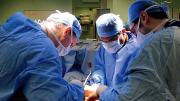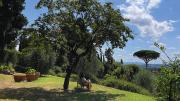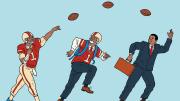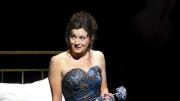Nuclear Weaponry
As a physicist and activist, I read “Nuclear Weapons or Democracy” (by Craig Lambert, March-April, page 47) with interest. Though it would be wonderful to ban and destroy extant nuclear weapons, it is an unrealistic prospect considering that the genie is out of the bottle. On top of that, despite their incredibly dangerous nature, humanity has had one of the longest periods of relative stability due to the MAD (mutual assured destruction) concept which provides a deterrent to their use and thus to world wars.
Given the reality that nuclear weapons are likely here to stay, what is far more worrisome is that our leaders are in general scientifically illiterate and thus wouldn’t honestly have a clue as to the truly destructive potential of these weapons of mass destruction for all life on this planet. We need leaders who understand the miracles of science that largely drive our economy, wellbeing and national security. They can make informed, educated, and rational decisions that will benefit all humanity. We also need to make major efforts to educate our citizens about science so that they too will be able to select like-minded leaders. Otherwise, it is a classic case of the blind leading the blind.
Michael Pravica, Ph.D. ’98
Las Vegas
Scarry says and Lambert agrees that “We got rid of Congress and the citizens” as support for their proposition that nuclear weapons and democracy cannot co-exist.
First, they do co-exist and have for many of the more peaceful decades in human history.
Second, if an ideal resolution of the conflict between war and democracy (hardly new) is the gradual reduction, to zero we hope, of nuclear weapons, that program will be more likely and more energetically pursued by democracies than alternative forms of government. See Obama.
Third, Congress has not “abdicated” its function, nor have we citizens. Congress rightly refused to declare war in any conflict since World War II because it wisely recognized how that would transform the conflict into Armageddon. We risked all against fascism for good reason. No equivalent challenge has presented itself, and our Congress and our citizens have recognized the difference, thank God.
Nuclear-weapon existence is a fact. We address that fact best within our democratic ideals and procedures because therein lies our best hope.
Bruce A. McAllister, LL.B. ’64
Palm Beach
Thanks very much for the article about Elaine Scarry’s book on nuclear weapons. Although the Cold War has ended, these weapons remain to be dismantled and until then they threaten all of us. I’m in complete agreement with Scarry that democracy and n-weapons are incompatible.
As a Quaker who has spent many years of my life struggling against these weapons, I would take the analysis one step further. Our most basic biological (and theological) imperative is survival and since these weapons threaten that, they must be considered evil in the most fundamental sense. In order to finally get rid of nuclear weapons, as Scarry urges, we must come to perceive the construction, holding and planning, and of course the use of these weapons as morally wrong. As a colleague of mine once wrote on the wall of a highway underpass, “It’s a sin to build a nuclear weapon.”
A corollary is that we must also close down the nuclear-power industry. All nuclear fission reactors produce plutonium in their waste fuel and this can be reprocessed to separate the material for a weapon. Again, the huge amount of power which a nuclear weapon places in the hands of a small group of people creates a temptation which we as humans cannot resist.
I also agree that of course we humans can take apart the nuclear weapons. The power of people working together may be the only power stronger than a nuclear weapon. My suggestion is that the United States close all of its nuclear power plants and challenge the rest of the world to do the same, while pursuing international negotiations to lower n-arsenals to zero within less than a generation.
William W. Smith III ’69
Jamestown, R.I.
Breathtaking! Such philosophical purity, such artful focus, such certain conclusions—all untainted by Realpolitik. It makes one almost sorry to have to point out opposing sentiment among Ukrainians, who were rather famously “fighting for democracy” as Craig Lambert’s doting tribute to Elaine Scarry’s recent book went to press. Multiple sources, including Time and USA Today, reported:
The United States, Great Britain, and Russia signed a pact to assure Ukraine’s territorial integrity in return for Ukraine’s giving up a nuclear arsenal it inherited from the Soviet Union after declaring independence in 1991. “[T]here’s a strong sentiment in Ukraine that we made a big mistake,” Pavlo Rizanenko, a member of Ukraine’s parliament, told USA Today. “In the future, no matter how the situation is resolved in Crimea, we need a much stronger Ukraine. If you have nuclear weapons people don’t invade you.”
Perhaps Professor Scarry and Dr. Lambert would wish to acknowledge an additional, potentially existential element to the relationship between nuclear weapons and democracy.
John Paul Clarke ’67
Fairborn, Ohio
Elaine Scarry argues well that nuclear arsenals “undo governments…and democracy.” I believe the same could be said of our too-big-to-fail financial corporations. Attorney General Eric Holder, our government’s chief law-enforcement officer, has essentially said that their power and reach prevent him from enforcing our laws: “The size of some of these institutions becomes so large that it does become difficult for us to…bring a criminal charge; it will have a negative impact on the national economy, perhaps even the world economy.”
Judy Jensvold
Ithaca, N.Y.
Animal Research
Professor Seung-Schik Yoo’s research on computer-mediated brain-to-brain connectivity (“Fusing Faculties of Mind,” March-April, page 8) provides another reminder of the startlingly sophisticated work being done by Harvard’s talented faculty. And yet, as this project is described as being undertaken to better comprehend empathy and connectivity between subjects, I cannot wonder if it is compromised from the outset by its very methodology. Confining and subjecting a non-volunteer (in this case members of the species Rattus norvegicus) to an albeit minimally invasive experimental procedure seems to almost inescapably deny a basic empathetic acknowledgement that the rodents would prefer not to be there at all. If, as Yoo says, his research “is more philosophical than practical,” perhaps he ought to acknowledge the increasingly orthodox ethical opinion that the abuse of non-human animals to satisfy what he himself describes as “boyish curiosity” is indefensible and instead conduct his trials on willing human volunteers. Confinement and unidirectional manipulation seem at the least to be a circuitous route towards empathy and, more likely, a dead end.
Dr. Nancy Schniedewind, M.A.T. ’70
New Paltz, N.Y.
How Libraries Serve
Tozzer Library staff members are looking forward with great excitement to our move into our new building on Divinity Avenue in a few short months for all the reasons given (Brevia, March-April, page 22). I would only argue that adding more collaborative spaces does not mean that without them in our very outdated 40-year-old building we were merely a “storehouse” for print volumes. I know all the thousands of faculty, students, and scholars Tozzer Library has served over our almost 150-year history would agree. And the role of academic libraries is not so much changing in my view but rather expanding, since we are expected to do all the things we’ve always done, including identifying and acquiring a huge amount of material appearing only in print, plus much more.
Janet L. Steins
Associate Librarian for Collections
Tozzer Library in William James Hall
Attentive Schlesinger
About the life of Arthur M. Schlesinger Jr. (Open Book, March-April, page 57): I had a seminar with Schlesinger during my graduate year in history at Harvard in 1959-60. In my mind’s eye I see him, in seminar sessions in the grey of late fall afternoons, discoursing informally on the writing of history. I wrote a long seminar paper for him, for which he provided detailed comments. I also took his course in American intellectual history.
Later, as a law student, I wanted to do a graduate year in law at Harvard. I wrote Schlesinger, who was then in the White House, asking if he would recommend me for that graduate program. I mailed the letter on November 20, 1963. After a couple of weeks I assumed that because of the assassination of President Kennedy, he would not be writing a recommendation.
But in mid-December, I received a note on White House stationery. Schlesinger commented that I could appreciate that he had been exceptionally busy but advised me that he had in fact written a recommendation for me. I subsequently learned that his letter had been a factor in my admission to the graduate program, with an accompanying fellowship. I’m now well into my fifth decade in law teaching, and that experience still provides extra incentive for my long-time practice: to put letters of recommendation ahead of everything else, including current manuscripts.
After my first year as a law student, while interning at the National Labor Relations Board, I was able to get an appointment with Schlesinger in the White House. I brought along my copy of his The Coming of the New Deal, which he autographed. I recall his appraising eye as he turned the pages of my Book-of-the-Month Club edition, with obvious interest in the very texture of the book.
Marshall S. Shapo, A.M. ’61, L ’65, S.J.D. ’74
Vose Professor of Law
Northwestern University School of Law
“Bellboys”
Re: Yesterday’s News (March-April 2014, page 20). The entry for 1939 lists amusing nicknames for undergraduate houses, including “Puritans” for Winthrop and “Elephants” for Eliot. However, the nicknames are not as innocuous as they sound. My father, Charles H. Robbins ’42, lived in Lowell House, which acquired the nickname “Bellboys.” At the time, Lowell House was where all the students on scholarships lived.
Elizabeth Robbins, M.D.
Boundary Bloodshed
Belligerent threats over the proposed U.S.-Canada boundary settlement of 1831 may have been “inflated humbug” (“Boundary Issues,” Treasure, March-April, page 76), but they sent 20,000 militia to the Maine-New Brunswick border in the 1839 “Aroostook War.” Maine’s Governor Fairfield was urged “to become second only to Moses and Washington [and] overrun the whole of Canada.” So bellicose was New York that “any sympathy with the ‘Peace Party,’ will ruin a man unto his third or fourth generation.” In Boston whiskers were curling and mustachios growing, because those lacking them “cannot with a good grace shout war! WAR! WAR!” Hawks assailed squeamish Governor Everett, Harvard’s future presdent: “Ye Yankees of the Bay State,/With whom no dastards mix!/Shall Everett dare to stifle/The fire of seventy-six?” Maine lost two men: a soldier died of measles; a bullet fired to celebrate peace ricocheted and killed a farmer.
David Lowenthal ’44
Berkeley
Eviction
I appreciated the article on eviction (“Disrupted Lives,” January-February, page 38), but was dismayed by the letters from readers who prescribed the nuclear family, a high school education, and a fast-food job with no benefits as routes out of poverty (March-April, page 2).
As a teacher, I have seen students who stayed in high school and yet are barely literate—it doesn’t matter how hard you work if your school cannot provide a quality education. I assume that those readers who promoted “staying in high school” as a solution are all ardent advocates for public education themselves, doing everything they can to support public schools in the poorest areas of the cities in which they live.
As for escaping poverty through a fast-food job, readers might consult the McDonald’s Corporation’s own “suggested budget” released last year, which showed that someone working two jobs for 71 hours a week at minimum wage would still be unable to afford gas or heat.
Regarding nuclear families, I’m not from one myself, but I did have access to a quality public school system, as well as family who had been union members for two generations, able to bargain for decent wages, benefits and retirement—one of the most effective ways in which the poor have improved their lot, historically, and yet one which conservatives usually fail to mention, oddly enough.
The bottom line is that people can escape poverty, but they need those of us who have had the luck to attend elite institutions to join them in advocating for quality public education, a living rather than a minimum wage, and the restoration of a strong social safety net that guarantees freedom from food insecurity, universal access to health care, and pre-K childcare for working parents. The rest of the developed world does it; we could do it, too.
Dr. Tara Kelly ’91
Durham, N.C.
In their responses to the eviction article, many letter-writers expressed an astonishing degree of prejudice against the poor. Poor people were variously characterized as liars, cheaters, vandals, and so ignorant and lazy that they must be told “loudly and often” that there is no need for them to be poor, because “one’s fate is predominantly self-determined.”
Most rich people manage to keep their lives entirely separate from those of the poor who don’t happen to be serving them. It is obvious to anyone not quite so isolated, however, that poor people are exactly like everybody else, except they have no money. They can be energetic or lazy, smart or stupid, violent or peaceable, just like rich people. As for the stability of their family lives, nothing is harder on relationships than lack of money to cover basic needs.
It will be a fine day when anybody who wants one can actually get a job that pays a living wage. Until then, holding poor people responsible for poverty is awfully convenient for the upper class. This theory allows the rich to deflect blame from themselves and the system that has taken such good care of them. Unfortunately, capitalism only works for people who have capital.
Imagine if you had no money, no property, no valuable connections, no elite education, no presentable clothing, and never had access to dental care. How far up the ladder do you think you could climb?
Jane Collins ’71
Medford, Mass.
Bigger Data
In his otherwise admirable article, “Why ‘Big Data’ Is a Big Deal” (March-April, page 30), Jonathan Shaw quotes Curtis Huttenhower as saying that commercial antibiotics “didn’t exist until about 50 years ago.” In fact, the first commercially available antibiotic, Prontosil, was developed in 1932, and its discoverer won the 1939 Nobel Prize, 75 years ago. Another early drug, tyrothricin, was widely used during the Second World War.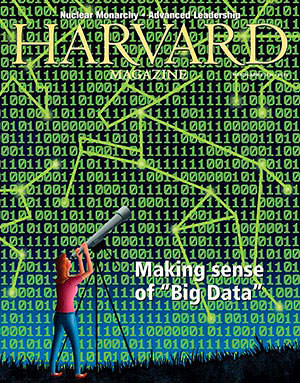
This is more than a quibble about whether or not 70 or 80 years is “about” 50 years. I can remember clearly what I was doing 50 years ago as a high-school student. When I reach 80, I may not remember much of anything.
John W. Farley ’70
Las Vegas
Editor’s note: We neglected to fact-check our sources fully enough, apparently. (For more on antibiotics, see this issue’s cover story, beginning on page 40.)
I found the “big data” article a good read; I certainly learned a lot from it. However, at the end, I noticed an historical error: you say, “From Copernicus using Tycho Brahe’s data to build a heliocentric model of the solar system...” No way! Tycho Brahe (1546-1601), whereas Copernicus (1473-1543). Obviously, Copernicus built his heliocentric model before Brahe was born. The astronomer who used Brahe’s data, particularly that for Mars, was Johannes Kepler (1571-1630), which led him eventually to propose that the planets travel on elliptical orbits about the sun, with the sun at one of the foci of the ellipse. Ironically, Brahe gathered his data to refute Copernicus, since the heliocentric model cast doubt on the Bible, and Brahe was a staunch Lutheran for whom the Bible was the ultimate authority.
Frank R. Tangherlini ’48
San Diego
Citizen Soldier
I did a double-take when I saw the piece “Citizen Soldier” about Seth Moulton joining the U.S. Marines and fighting on the ground in the Mideast (The Classes, March-April, page 64I). No, this cannot be Harvard Magazine in 2014, I thought to myself! Sincere kudos to Moulton for walking the walk and marching to the tune of his own drummer.
William S. Patten ’70
Mount Desert, Me.
Loving Living in L.A.
As a former Harvard student who is now a professor at the University of Southern California, I was very interested to read Noah Pisner’s “The Undergraduate” column (January-February 2014, page 31) about transferring from USC to Harvard. But seriously: some random guy tells him “No one reads in Los Angeles,” and he accepts that as gospel? Time to work on those critical thinking skills!
I loved Harvard, and I love USC. But I can tell you from personal experience: it’s much nicer in February to sit outside in the sun, reading a good book, than to huddle inside under a blanket, avoiding frostbite.
Todd Brun ’89
Pasadena
As an alumnus of both Harvard and USC (B.A. ’07), I am disappointed in Noah Pisner’s characterization of Los Angeles and my alma mater. I’m not arguing with the assertion that Los Angeles is the land of Hollywood and starlets, nor will I disagree that USC has strong fraternity and football cultures. But in a university of about 18,000 undergraduates in a city of 3,000,000, it is both lazy and superficial to describe starlets and sun as the only aspects of them worth mentioning. Just because he wasn’t willing to probe underneath the surface during his one year in Los Angeles doesn’t mean he should make sweeping statements about the nature of the university or city.
Had Mr. Pisner bothered to walk several blocks to the south of the university, he could have seen the dire poverty that many USC students care passionately about and strive to correct through numerous public service organizations; this is how I became passionate about health-disparities work and was inspired to improve the delivery of healthcare for the underserved. Had he not been overly seduced by the party lifestyle of the Greek system and looked for other opportunities, he would have found a vibrant academic culture of literary aficionados, science nerds, tech geeks, and any other group he could possibly have wanted. I found many conversations with diverse people as intellectually fulfilling as any I’ve had at Harvard.
Yes, USC has sunny weather, beautiful people, and an exciting football team. Los Angeles does have a higher concentration of starlets than the average city, and they may or may not like people who read (perhaps Natalie Portman does, since she’s a Harvard alumna). But to paint the entire city as one who “doesn’t read” and say USC is all about song girls and football is to perpetuate the very superficiality that he describes, and I can only hope that Mr. Pisner’s future endeavors in writing don’t carelessly pander to stereotypes and instead delve more deeply into his subjects.
Hugo A. Torres, M.P.H. ’13, M.D.,
San Marino, Calif.
Hurrah for Humanities
I agree with Drew Faust’s comments on the importance of humanities for a “successful life” (The View from Mass Hall, March-April, page 3). However, I think she has left out the most important aspect of a liberal arts education versus majoring in something “useful.”
Let me explain: I majored in economics, the dullest possible subject, to help prepare for a “useful” career. Only one good thing came out of it: I wrote my thesis on the “Stock Market Predictions of Merrill Lynch Pierce Fenner & Beane.” They were terrible.
On the other hand, I have had a most “successful life” because of a liberal-arts education. It has led to a life-long enjoyment and love of history, French, fine arts, Shakespeare, music, and the general course on the sciences. Of course, I should add my thanks for English A.
W. M. Glasgow ’50, M.B.A. ’52
Houston
Robert Frost
Remarkable: Frost went from a broken home in the Victorian period to become a major poet and pioneering teacher in the twentieth century (“Extracting the Woodchuck,” January-February, page 44). The best assessment of his work probably comes in poet Randall Jarrell’s essays.
Ed Barna ’70
Middlebury, Vt.
First manager of Robert Frost Farm State Park in Derry, N.H.
Learning and Life
Though I went to Harvard Medical School, my college loyalties have largely been related to a school I love and remain close to since graduation in 1954, Yale. While accepted by Harvard College, I chose its southern sister for no particularly good reason, and without really knowing much about either place.
Since graduating I have come to recognize better the greatness of both universities, and have sometimes been jealous of—and even irritated by—the accolades frequently bestowed on Harvard. So I read the many communications that come from Boston reluctantly.
However, the last issue of Harvard Magazine was so fine, so fascinating, so pertinent I was unable not to comment enthusiastically. Pages 2 through 6 should be required reading for every person. The “editorial” by President Faust is a calmly passionate, beautifully reasoned, profound and convincing justification for a liberal-arts education.
I am a clinician-scientist and recognize the need for and the power of technology. But neither science nor technology will make the world a better place. President Faust appears to believe this, too. If the world is to be a better place, it will come primarily through proper use of technology. And the proper use will come from people who question why we are here, who we are, how we relate to other people and other creatures and the universe and what is greater than the universe and how we can use science and technology to work towards a world based on—as much as possible—win/win for all.
George L. Spaeth, M.D. ’58
Esposito Research Professor
Wills Eye Hospital
Philadelphia
Alternative Giving
With Harvard knocking on our doors for contributions to the Harvard Campaign, we think it is vitally important to alert fellow alumni to the recent launch of the Harvard Social Alternative Fund. As previously reported, responding to pressure from students and alumni, the Corporation Committee on Shareholder Responsibility (CCSR) inaugurated a Social Alternative Fund on July 1, 2013. The Corporation Committee has selected the Parnassus Equity Income Fund as the investment vehicle. Managers at the Parnassus fund give special consideration to environmental, social and governance factors when making investments (www.parnassus.com).
We do not believe that the University is going to do much, if anything at all, to promote the Social Alternative Fund. Thus we want to explain how alumni can earmark contributions to the Campaign to be invested in the Social Alternative Fund: The primary avenue for giving will be online through the HAA website. (Go to “Make a Gift”; select the Social Alternative Fund.) Gifts to the Social Alternative Fund will still receive class credit even though they fall outside the Harvard College Fund.
Nina Gardner ’82
Washington, D.C.
Barbara Gillette ’82
New York City
Helene Marsh ’82
Tiburon, Calif.
Henry Murray
Your brief Vita on Henry Murray (March-April, page 36) is good on some of his work, but, as you must know, it says not a word about his horrifically controversial work with the CIA “studying” the Harvard student who became the Unabomber and much else. There are very detailed books and articles on this and much else in his life that many see as very “shady.”
I had friends who worked with him and knew well about his Soc Rel work when I was a student in the department. I agree very much with his life studies approach and have done life studies, but I stayed clear of him at the time because of his involvement with the more mechanistic and systemic people in Soc Rel like [Talcott] Parsons and [Robert F.] Bales.
I do not know the full truth about these alternative views of Murray’s life, but some of them seem to me to be true in part and certainly worthy of consideration in a bio of any size on his work.
I don’t think he can be “convicted” of having “caused” the Unabomber’s violent mail-attacks, but The Atlantic article and later book on this are serious works demanding consideration.
Veritas, Truth, demands all the major facts and points of view.
I would love to know Murray’s response to all of those charges, or the responses of his dedicated students, but do not find them. Perhaps Harvard Magazine answered them earlier and I missed the articles?
I love your magazine and have never before felt the need to ask for clarification in this way.
Jack D. Douglas ’59
La Jolla, Calif.
Correction
In the Harvard Portrait of Huntington Lambert, Harvard’s new dean of continuing education and University extension (March-April, page 19), it was reported that Harvard is now offering HarvardX online courses for credit. In fact, one HarvardX course is being offered with additional student services, but enrolled learners earn certificates of completion, not course credit, through the division of continuing education.




